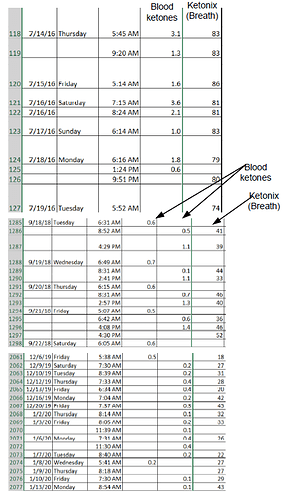Hi everyone. Today, after my lovely morning walk, I’ve been gorging on articles regarding nutrition (my old hobby horse), and today I looked into Dr. Stephen Phinney and came across this article which I thought to share, it is quite possible it’s already been shared in the forum before.
I’ll just copy a small extract here: Defining Characteristic #2: A WFKD has to provide adequate macronutrients to preserve lean body mass and function.
-
Effective protein intakes can range from 1.2 to 2.0 g/kg-d reference weight, where reference weight is based upon sex-based standard values for height⁷,⁸. See protein recommendations.
-
In this protein dose range, the addition of dietary carbohydrate is not necessary to maintain lean body mass⁷,⁹.
-
The combination of both carbohydrate and protein intakes at the upper ends of an individual’s tolerance range typically drives ketones down out of the NK range, particularly for those with underlying insulin resistance. For this reason, the best practice of a WFKD typically requires holding protein in moderation and adding just enough dietary carbohydrate to allow dietary variety and provide valuable micro-nutrients and minerals from vegetables, nuts/seeds, and berry fruit.
~
So it appears Dr. Stephen Phinney does believe consuming too much protein could drive ketones down, potentially kicking one out of ketosis? Any thoughts on this? Though intuitively, this is how I’ve been eating, I’ve eaten fats and proteins to pleasant satiety, for example I like having a snack plate of three dollops of KerryGold butter which I think taste delicious on its own. Since I could never do OMAD and eat that much food in one sitting, I eat 2-3 meals a day, which usually involves cuts from different animals, sometimes fish too and eggs.
Dr. Stephen Phinney does believe one can obtain valuable micronutrients and minerals from vegetables, nuts/seeds, and berry fruit. His take on a well formulated ketogenic diet appears to be based more on dietary variety whilst still reaping the benefits of remaining in ketosis. Any thoughts?
I will continue to look into his work, but as with everything, there is always the trap of becoming biased. {Meaning, one tends to find information that agrees with one’s viewpoint.} Anyway, I’m off to boil my pasture eggs, which I will enjoy with my KerryGold, and a glass of raw milk🙂




 Much food for thought today, but my biggest indicator the WOE is working wonderfully (after giving up conventional dairy, that was the glitch) is how good my body is now feeling, even whilst taking a medication that used to have noticeable side-effects.
Much food for thought today, but my biggest indicator the WOE is working wonderfully (after giving up conventional dairy, that was the glitch) is how good my body is now feeling, even whilst taking a medication that used to have noticeable side-effects.